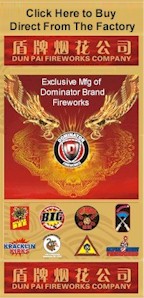


|
Welcome To
Dominator Fireworks
END OF AN AGE?
Have
We Come To The End Of The Golden Age By
Dominator Export Fireworks Co.
The last ten years have truly been the golden age for Chinese fireworks importers. During this period importers have enjoyed a combination of factors that is extremely rare in international trade: Currency was stable, quality and variety were going up, China tax rebates and increased competition in China drove prices down, shipping was stable, and US border inspections were less common. Truly it was a golden age for any importer. In July 2005 China’s currency was allowed to float, and since then the change in currency has added 8% to the cost of fireworks (8.28 RMB/$ to 7.6 RMB/$) and it continues to get worse. A tax rebate system was introduced after the 1997-98 Asian financial crisis to contain jitters. Tax rebates are common in international trade. Governments usually return value-added and consumption taxes to export-oriented companies for their products sold abroad. In China’s case there is a 17% VAT tax and a 15% consumption tax. The tax rebate system helped to encourage exports, and in fact exports of fireworks and many other products rose dramatically, so much so that China’s export trade surplus has surged 73% since last year to $22.5 billion. In an effort to reduce trade friction, China has decided to cut the tax rebate as of July 1st on 2,831 different types of products, one of which is fireworks. The fireworks rebate will be cut from 13% to 5%. What this means is that Chinese fireworks producers now have to pay 8% more in taxes. Helped by the surge in exports, China’s domestic economy has been one of the few economies in the world to consistently grow at more then 10% annually. With this domestic growth, China’s costs have also been growing. Despite a huge labor force, wages have been steadily going up in the fireworks industry as workers move to more comfortable, less dangerous jobs. High turnover rates, and thus lower productivity in the factories, have contributed to true cost increases. Also, many fireworks chemicals are very energy intensive to manufacture and therefore chemical prices have been rising proportional to increased energy costs. What this means is that real costs have been increasing for China factories. To a large extent the factories have been absorbing these costs as competition between the more then 1,500 privately owned fireworks companies and factories have kept prices low. However,
three forces are at work to give Chinese factories more leverage to
increase prices. First, margins have gotten so low that many factories and
companies are simply going out of business, leaving fewer, stronger
companies behind. Second, the Liuyang government, which cannot collect
income tax unless businesses are profitable, has been encouraging small
factories and companies to join together into larger groups and increase
prices collectively. Finally, and by far the most important factor, the
China domestic consumer fireworks market was once again opened after a 10
year ban on domestic consumption. In less than 2 years, China’s domestic
fireworks market has become the largest market in the world. Factories,
who once could only export to survive, now have the freedom to sell
directly into the Chinese domestic market. In many cases, profits are
higher and payment terms are better selling to their brothers in the next
province, than to US importers thousands of miles away.
To
make matters worse, since the March 21st, 2006 fire on the
Hyundai Fortune, shipping costs have continued to rise. Nearly two years
later US importers have only one choice for 1.3G shipments and only a few
choices for 1.4G.
It
seems that combined together, all of this spells the end of the golden age
of China importing. Many have speculated what will come next. Will
importers in search of lower costs look to other countries such as India,
South East Asia or Vietnam? Possibly, but despite increasing costs from
China, Chinese fireworks are still extremely cost effective. It will be a
long and costly process to build the same kind of efficiencies See other articles of interest: |
|
Contact Us: |
|
phone: 262-347-6510 |
|
e-mail: info@dominatorfireworks.com |
Interested in shooting professional display's with 1.4G material? See our complete line of professional outdoor low level aerial FX at our sister company Progress Pyro
Members of APA,<NFA,PGII, and many regional clubs (WPA, WPAG, etc.)




